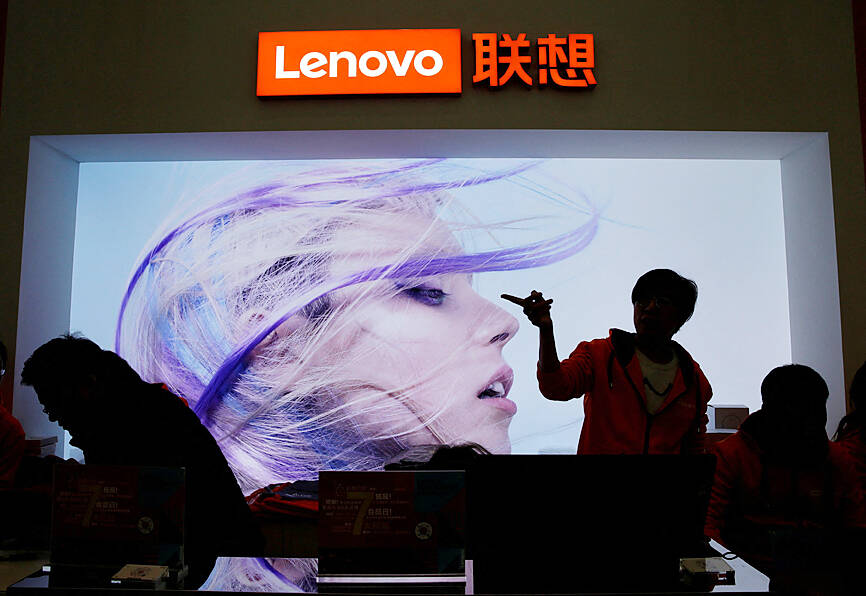Lenovo Group Ltd (聯想) reported a smaller-than-expected profit decline after PC demand showed signs of recovering from a bout of post-COVID-19 weakness.
The world’s largest PC maker reported a 54 percent fall in net income to US$249.2 million for the three months ended September, compared with analysts’ average estimate of US$224.9 million. Revenue was US$14.4 billion, matching the average projection.
It was the fifth straight decline in quarterly revenue and the fourth straight fall in net income, as an anticipated Chinese economic recovery fell short of expectations.

Photo: Reuters
Lenovo, HP Inc and Dell Technologies Inc are grappling with an industry downturn that emerged after the COVID-19 era, driven by rapid inflation and economic uncertainty around the globe.
However, that downward spiral slowed in the third quarter, research firm International Data Corp (IDC) said.
Lenovo, whose shipments fell 5 percent, managed to keep the top position, despite HP narrowing the gap, IDC said.
Shipments are “well on track” to begin coming back from the fourth quarter, which would help ease inventory and improve Lenovo’s margins, UOB Kay Hian analyst Johnny Yum wrote in a memo ahead of the earnings release.
“The new replacement cycle should start to kick in in 2024 with the upcoming Windows update,” Yum said.
Lenovo’s shares have gained almost 50 percent this year, driven by anticipation of demand for artificial training (AI) training servers and data center construction in China.
Longer term, the US has expanded restrictions on chip exports to its political rival, a move that could hamstring AI development and affect Lenovo’s server business.
The Chinese company buys advanced processors from US chip suppliers like Advanced Micro Devices Inc to Nvidia Corp for its consumer and enterprise products.
Senior Lenovo executives reassured analysts in a call last month that the company was working with suppliers to determine which products were subject to the rule, Citigroup analyst Carrie Liu wrote.
Lenovo’s net income could fall as much as 5 percent between fiscal 2024 and 2026 if US curbs hit its server unit in China, Goldman Sachs analysts Verena Jeng and Allen Chang estimated ahead of the earnings release.
The Infrastructure Solutions Group accounted for less than 15 percent of the company’s sales last fiscal year, but is more profitable than consumer electronics, such as PCs and smartphones.
“Lenovo’s diversified customer base could support the company’s AI server customer base diversification, managing the negative impact,” Jeng and Chang said.

The US dollar was trading at NT$29.7 at 10am today on the Taipei Foreign Exchange, as the New Taiwan dollar gained NT$1.364 from the previous close last week. The NT dollar continued to rise today, after surging 3.07 percent on Friday. After opening at NT$30.91, the NT dollar gained more than NT$1 in just 15 minutes, briefly passing the NT$30 mark. Before the US Department of the Treasury's semi-annual currency report came out, expectations that the NT dollar would keep rising were already building. The NT dollar on Friday closed at NT$31.064, up by NT$0.953 — a 3.07 percent single-day gain. Today,

‘SHORT TERM’: The local currency would likely remain strong in the near term, driven by anticipated US trade pressure, capital inflows and expectations of a US Fed rate cut The US dollar is expected to fall below NT$30 in the near term, as traders anticipate increased pressure from Washington for Taiwan to allow the New Taiwan dollar to appreciate, Cathay United Bank (國泰世華銀行) chief economist Lin Chi-chao (林啟超) said. Following a sharp drop in the greenback against the NT dollar on Friday, Lin told the Central News Agency that the local currency is likely to remain strong in the short term, driven in part by market psychology surrounding anticipated US policy pressure. On Friday, the US dollar fell NT$0.953, or 3.07 percent, closing at NT$31.064 — its lowest level since Jan.

Hong Kong authorities ramped up sales of the local dollar as the greenback’s slide threatened the foreign-exchange peg. The Hong Kong Monetary Authority (HKMA) sold a record HK$60.5 billion (US$7.8 billion) of the city’s currency, according to an alert sent on its Bloomberg page yesterday in Asia, after it tested the upper end of its trading band. That added to the HK$56.1 billion of sales versus the greenback since Friday. The rapid intervention signals efforts from the city’s authorities to limit the local currency’s moves within its HK$7.75 to HK$7.85 per US dollar trading band. Heavy sales of the local dollar by

The Financial Supervisory Commission (FSC) yesterday met with some of the nation’s largest insurance companies as a skyrocketing New Taiwan dollar piles pressure on their hundreds of billions of dollars in US bond investments. The commission has asked some life insurance firms, among the biggest Asian holders of US debt, to discuss how the rapidly strengthening NT dollar has impacted their operations, people familiar with the matter said. The meeting took place as the NT dollar jumped as much as 5 percent yesterday, its biggest intraday gain in more than three decades. The local currency surged as exporters rushed to